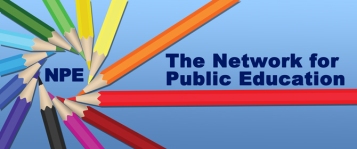Once when I was in high school, a friend handed me a plate of chocolate chip cookies. They looked delicious! But just as I was about to eat one, she snatched them back. They looked great on the outside, she told me, but they tasted terrible. She had left out a key ingredient—sugar.
This story is exactly how I think about the numerous state education report cards making the rounds. Instead of filling you with great, inspiring information, most of these glossy, colorful reports are misleading and ideological. They are basically not worth consuming.
One of the mechanisms so-called education “reformers” have used to promote their top-down, privatization agenda for public education is the state-by-state education report card. Organizations such as Students First, American Legislative Exchange Council (ALEC), Thomas B. Fordham Institute, and Education Next have recently released report cards for each of the fifty states.
 What’s wrong with these state report cards? Most state-by-state ratings focus primarily on outcomes, such as state standardized test scores, and basically ignore educational inputs—the ingredients—that make public education successful. These report cards are obsessed with accountability systems that look like bold education “reform,” but that favor top-down, private control of public schools, with dubious results for kids.
What’s wrong with these state report cards? Most state-by-state ratings focus primarily on outcomes, such as state standardized test scores, and basically ignore educational inputs—the ingredients—that make public education successful. These report cards are obsessed with accountability systems that look like bold education “reform,” but that favor top-down, private control of public schools, with dubious results for kids.
Take just two examples.
Students First, an organization started by the controversial District of Columbia education reformer Michelle Rhee, issued report cards giving positive ratings to states if they allowed for parent trigger. Parent trigger is a policy that allows parents (in any given year) to vote to turn over a school and all of its public property to a corporation with a simple majority vote. The Students First report also gave states favorable ratings for prioritizing states’ and mayor’s’ ability to take over school districts. Top-down hostile takeovers of schools by states and mayors have a long and documented history of underwhelming performance and failure.
The state education reports issued by ALEC, a prominent corporate lobbying group that promotes neoliberal model legislation across public policy issues, prioritized “innovative educational practices necessary for transformational change.” They gave states positive ratings if they allowed the use of public dollars for private school choice (i.e. tax credits, vouchers, education savings accounts).
Several decades of peer-reviewed charter school and voucher research have demonstrated that choice is not a panacea. In fact, school choice has in many ways enhanced this country’s unfortunate and problematic “separate and unequal” system of schools for many vulnerable students by failing to serve those with special needs and intensifying segregation. ALEC’s report card also prioritized corporate-run online charter schools—research about whichdocuments a dismal performance.
But here’s the sugar in this story.
To counter these kinds of biases in state education report cards, the Board of Directors from the Network for Public Education (NPE), an educational grassroots organization founded by Diane Ravitch, designed a new report card focused on how well a state is “acting as a responsible guardian of public schools.”
NPE’s report cards evaluates all 50 states and the District of Columbia according to six research-based criteria: support of high-stakes testing, professionalization of teaching, resistance to privatization, equity in school finance, spending taxpayer resources wisely and student chance for success.
The bad news is that most states are not doing very well. NPE were tough graders as no state received more than a “C”. However, the new NPE report card isn’t distracting us with a pleasing facade covering up a lack of what’s important.
Understanding that the closing of the achievement gap in our nation considerably slowed during the No Child Left Behind era of testing and accountability, NPE did not prioritize performance on standardized exams for students or high-stakes testing evaluating teacher performance.
Contrary to previous report cards, NPE agreed with the American Educational Research Association and rewarded states with demanding certification requirements, lower attrition, higher pay, and the support of teachers with certification and experience.
Instead of an emphasis on top-down, private control, and privatization, NPE’s report card rewarded states that protect neighborhood community schools and disallow the use of public money for private and religious schools.
NPE’s report also gave “high grades to states that implemented the most adequate and equitable funding” across communities. Equitable funding in the Student First report cards, in contrast, means that charter schools received funding priority—including resources for facilities that corporations or individuals would ultimately own even though the property was purchased by the public (as is the case in Arizona).
 NPE’s report card prioritized investments in community-based solutions, including Pre-K and class size reduction—reforms that make the gold standard in the research literature in terms of student success.
NPE’s report card prioritized investments in community-based solutions, including Pre-K and class size reduction—reforms that make the gold standard in the research literature in terms of student success.
The NPE report card also included measures of child poverty and school segregation across states—“chance for success” metrics that neither ALEC nor Students First included in recent report cards.
The Network for Public Education’s report card is an important correction to the previous, flawed reports. It evaluates states according to how well they are supporting their schools, using measures based on ingredients that we know are important to a good public education.
Julian Vasquez Heilig is the Westcoast Regional Progressive Education Fellow.
– See more at: http://www.progressive.org/pss/most-state-education-report-cards-miss-critical-ingredients#sthash.21UQbqKy.dpuf
Please Facebook Like, Tweet, etc below and/or reblog to share this discussion with others.
Want to know about Cloaking Inequity’s freshly pressed conversations about educational policy? Click the “Follow blog by email” button on the home page.
Twitter: @ProfessorJVH
Click here for Vitae.

I am thinking about all this tough accountability talk for schools, without the corresponding talk about larger and more meaningful social issues such as poverty and inequity that inform school outcomes. Wouldn’t it be wonderful if report cards were issued for state governments that not only measured how well they support public schools, but that held them directly responsible for measures of child welfare (poverty, homelessness, food insecurity, regular doctor and dentists visits, etc.) in their states?
LikeLike
Yes!!!!
LikeLike